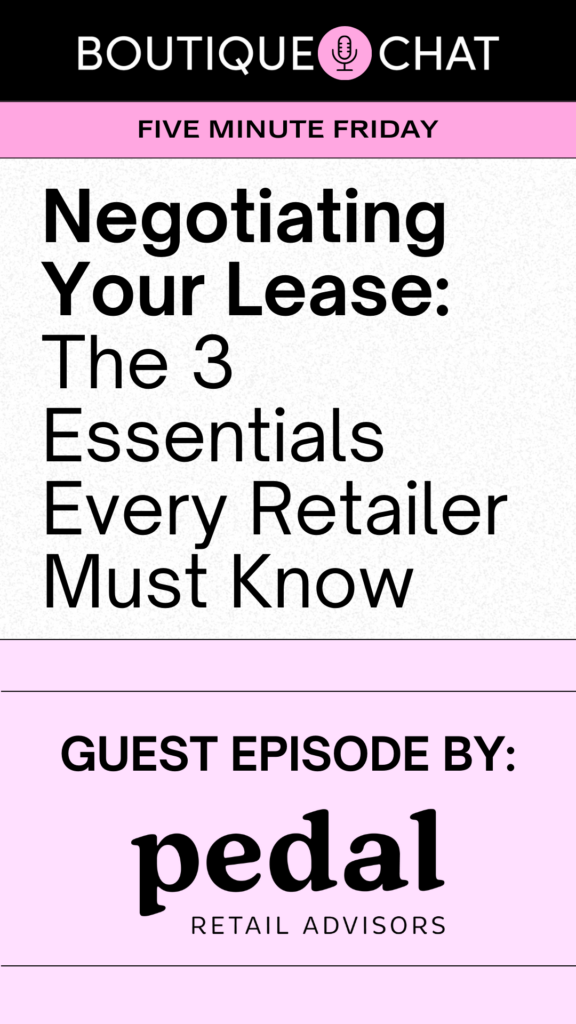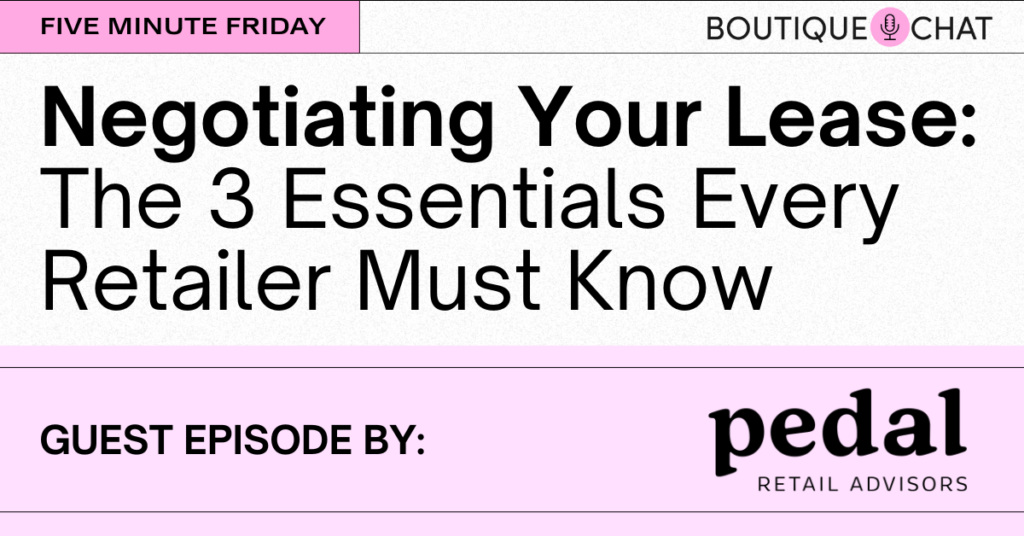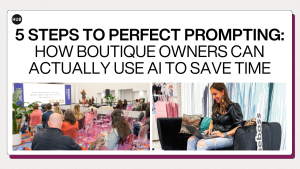APPLE PODCAST | SPOTIFY | YOUTUBE
When opening or relocating a brick-and-mortar retail space, negotiating your lease is a critical step for setting up your business for success. Abby and Sheila from Petal Retail Advisors, experts in retail real estate, share their top three tips for negotiating your lease and why these steps can make or break your business.

Negotiating Your Lease: The 3 Essentials Every Retailer Must Know
1. Rent: Know What Works for Your Business
The first and most obvious element to negotiate is the rent. But instead of focusing on finding the cheapest rent or comparing what your neighbors are paying, you need to base the rent on what is affordable for your business. A critical metric to consider is occupancy cost, which is the total rent divided by your revenue.
For a healthy retail business, occupancy costs should be around 10% of your revenue. For example, if you anticipate making $20,000 in monthly revenue, your rent should not exceed $2,000. Focus on finding a rent that supports your business’s profitability rather than simply trying to score the lowest price.
2. Concessions: Get Creative with What You Ask For
Concessions are incentives that landlords offer to make their space more appealing than competitors’. Common lease concessions include:
- Rent abatement (free rent): This is rent-free time after you’ve opened for business.
- Tenant improvements (TI): Financial contributions or construction assistance from the landlord to help with your buildout.
- Broker’s commission payment: Some landlords will cover the commission for your real estate broker.
Landlords expect to negotiate concessions, and these offers are often baked into the deal. Don’t be shy about asking for what you need to make the space work for you. Remember, the landlord isn’t giving you something for free—they’re making these concessions with the expectation that your business will generate long-term rent payments.
3. Rent Commencement Date: When the Clock Starts Ticking
One of the most overlooked but crucial aspects of your lease is the rent commencement date—the day you are required to start paying rent. You should not be paying rent before your store is open for business. While you’re building out the space, make sure that you negotiate a reasonable time frame between signing the lease and the rent commencement date.
This timeline should factor in everything from construction delays to inventory arrivals or personal circumstances, like family obligations. Both you and the landlord want to ensure that your business is financially ready to pay rent when it opens, so don’t overlook this vital point.
Bonus: You Have the Power to Negotiate
Even if you’re new to the retail game, you have negotiating power. Independent retailers are what make downtowns and main streets vibrant and unique. Smart landlords know this and want to attract businesses like yours that add character to their property. Don’t settle for the first offer you see—negotiate a lease that sets your business up for success.
For more tips on negotiating your lease, visit Petal Retail Advisor’s on their website. They’re here to help you get a great deal and avoid costly real estate mistakes.
In This Episode
Let’s Connect #AskAshley
- Have a question or guest recommendation? Let us know your feedback directly here!
- Do you love the Boutique Chat Podcast?! Subscribe to our podcast and after that, leave us a review on iTunes Apple Podcasts here!
Must Have Resources
- The Boutique Hub: Website | Facebook | Instagram | Pinterest | TikTok | YouTube
- Boutique Summit 2024
- Small Business Marketing Handbook
- Small Business Hiring Handbook
- Brand Owner Basics Masterclass
- Tradeshow Marketing Handbook
- 2024 Trade Show Calendar
- Boutique Hub Black
- Hubventory.com
Recent Posts:
- 5 Steps to Perfect Prompting: How Boutique Owners Can Actually Use AI to Save Time
 Tried AI but didn’t get great results? Here’s how to use ChatGPT for retail marketing the right way — with smarter prompts that save time and increase sales.
Tried AI but didn’t get great results? Here’s how to use ChatGPT for retail marketing the right way — with smarter prompts that save time and increase sales. - How to Buy Wholesale Clothing for Your Boutique (Without Overbuying)
 Learn how to buy wholesale clothing for your boutique without overbuying. Use smart inventory planning, budget strategy, and reorder systems to protect profit.
Learn how to buy wholesale clothing for your boutique without overbuying. Use smart inventory planning, budget strategy, and reorder systems to protect profit. - The 5 Biggest Mistakes New Boutique Owners Make in Their First Year
 The first year of owning a boutique can make or break your business. Learn the five biggest mistakes new boutique owners make — and how to avoid costly inventory, margin, and branding missteps.
The first year of owning a boutique can make or break your business. Learn the five biggest mistakes new boutique owners make — and how to avoid costly inventory, margin, and branding missteps.




